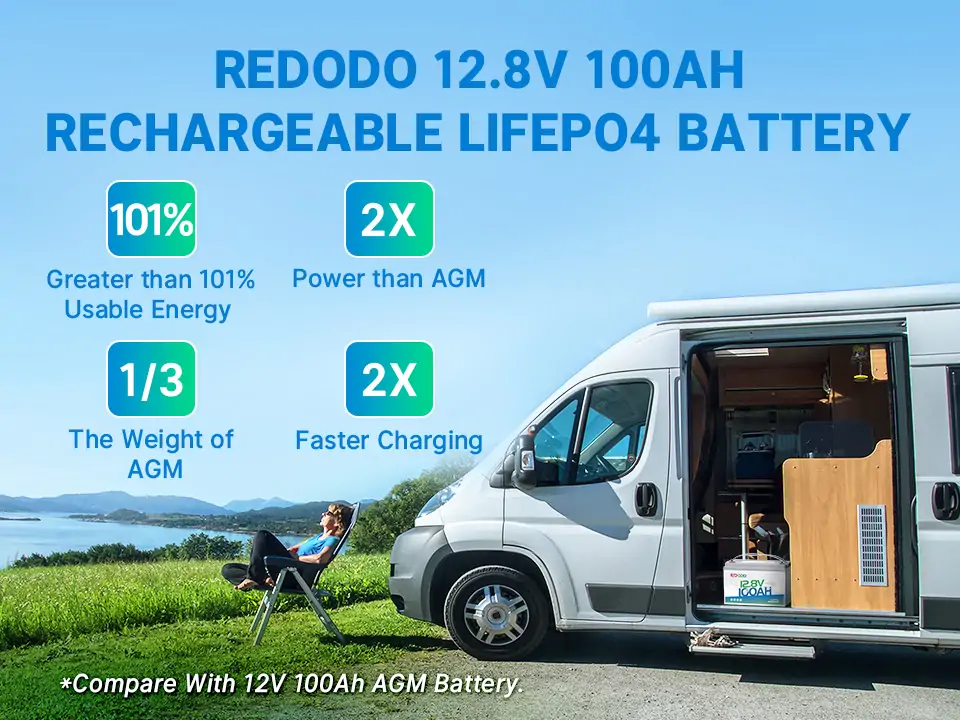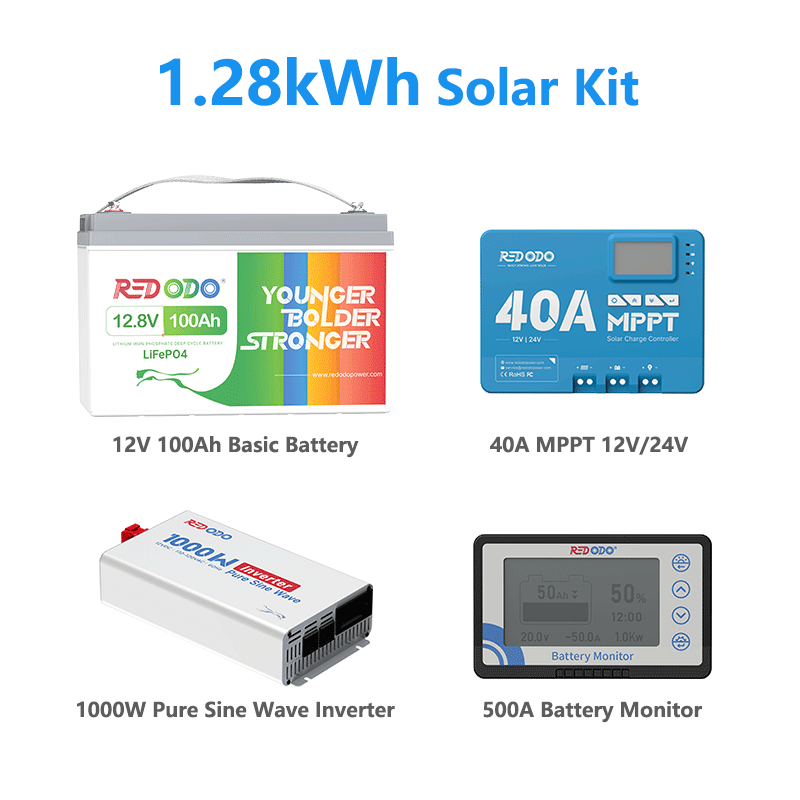Are Lithium RV Batteries Worth the Cost?
If you own an RV, one of the most important investments you’ll make is in your battery system. The right battery ensures reliable power for your appliances, electronics, and off-grid adventures. But with higher upfront prices, many RV owners ask: are lithium RV batteries worth the cost?
The short answer is yes—for many RVers, lithium batteries not only pay for themselves over time but also improve the overall travel experience. Let’s dive into why.
Table of Content
What Are Lithium RV Batteries?
Lithium RV batteries are advanced rechargeable batteries that use lithium iron phosphate (LiFePO4) chemistry, designed to provide reliable power for recreational vehicles.
Unlike traditional lead-acid batteries, lithium batteries deliver a higher usable capacity, lighter weight, and longer lifespan, making them a powerful upgrade for modern RV energy systems.
Redodo 12V 300Ah Lithium RV Battery
The Benefits of Lithium RV Batteries
1. Longer Lifespan = Long-Term Savings
One of the strongest arguments for lithium batteries is their longevity. Lead-acid batteries usually last 2–3 years, while lithium RV batteries can last up to 10 years with proper care.
As one RVer put it:
“It is worthwhile for long-term use. I think the appeal of lithium batteries partly lies in their low maintenance costs.”
This means that while you may buy multiple sets of lead-acid batteries over a decade, a single lithium battery pack could last the entire time.
2. Higher Usable Capacity
Lead-acid batteries can only safely be discharged to about 50% of their capacity under 1C discharge rate. That means a 100Ah lead-acid battery really gives you just 50Ah of usable power.
With lithium, however, you can safely discharge nearly the capacity without damaging the battery. This means fewer batteries are needed to get the same usable power.
3. Faster Charging Capability
Charging efficiency is critical, especially using solar panels or generators to charge. The higher efficiency (around 95–98% for lithium vs. 70% for lead-acid) makes lithium far more cost-effective over time.
For battery chargers, lead-acid batteries not only charge slower but also waste energy during the absorption phase. Lithium, on the other hand, accepts a much higher charge rate and can charge up to five times faster than lead-acid batteries.
4. Lightweight and Space-Saving
Lithium batteries are significantly lighter than lead-acid alternatives, often 50%-60% lighter. This makes a big difference for RVers with limited space or strict weight limits. It is especially valuable for full-time RVers or boondockers who need every inch and pound of storage efficiency.
5. Better Performance for Heavy Loads
Lithium batteries maintain consistent voltage even under heavy loads, making them ideal for running energy-hungry appliances in RVs like air conditioners, microwaves, or a 12V fridge.
In contrast, lead-acid batteries tend to sag in voltage under load, which can cause electronics to underperform or shut off early.
“LFP handles heavy load better, charges much faster, weighs less and has greater capacity. Personally, I boondock with solar and a 12V fridge. LFP is definitely a better option for my use case.”
Read More: 7 Advantages to Upgrade RV Power System with LiFePO4 Batteries
RV Battery Cost Comparison: Lithium vs. Lead-Acid
To put the cost into perspective:
- A quality 100Ah AGM battery might cost around $150–$250, but only 50Ah is usable, and it may last 3 years.
- A 100Ah lithium battery might cost $200–$350, but you get 100Ah usable capacity, faster charging, higher efficiency, and a 10-year lifespan.
| Feature | Lithium (LiFePO4) | Lead-Acid (AGM/Flooded) |
|---|---|---|
| Initial Cost (12V 100Ah) | $200–$350 | $150–$250 |
| Usable Capacity | ~100Ah | ~50Ah (50% depth of discharge) |
| Lifespan | 8–10+ years (3,000–5,000 cycles) | 2–3 years (300–800 cycles) |
| Replacements Over 10 Years | 1 | 3–4 |
| Total Cost Over 10 Years | $200–$350 | $450–$1,000 |
| Weight | ~25 lbs | ~65 lbs |
| Efficiency | More than 90% | ~70% |
While lithium costs more upfront, it delivers more usable power, higher efficiency, and fewer replacements, making it the smarter long-term investment for most RVers.
When Are Lithium Batteries Worth It for RVs?
You may want to know if it is necessary to convert lithium RV batteries. In the recent situations, lithium batteries are best suited for RV owners who:
- Use solar power regularly: Lithium ensures more efficient charging and maximizes expensive solar energy.
- Boondock or camp off-grid often: More usable power, faster charging, and lighter weight make them ideal for off-grid travel.
- Have high power needs: Running appliances like CPAP machines, air conditioning, or electric cooking gear benefits from lithium’s steady output.
- Plan for long-term use: While expensive upfront, lithium’s long lifespan means fewer replacements and less hassle.
However, lead-acid RV batteries may still be suitable if you:
- Often stay in RV parks with full hookups (shore power): Your batteries aren’t heavily used, so the benefits of lithium won’t pay off as much.
- Use your RV only a few weekends a year: Occasional light usage doesn’t justify the higher investment.
- Have minimal power needs: If you just run lights, fans, or a water pump occasionally, a traditional AGM or flooded battery can be sufficient.
How to Upgrade Lithium RV Batteries from Lead-Acid?
Switching from lead-acid to lithium RV batteries is straightforward, but there are a few important steps to ensure a safe and efficient upgrade:
1. Check RV Power System Compatibility
Review all parts of your power system, including the charger, inverter, MPPT solar controller, and battery monitor, to ensure they are compatible with LiFePO4 lithium batteries. Some older chargers and inverters are designed for lead-acid charging profiles and may need to be replaced or adjusted to safely charge lithium.
2. Choose the Right Lithium Battery
Select a battery that matches your power demand and compartment size. Consider not just the amp-hour (Ah) rating, but also the physical dimensions and weight capacity of your RV’s battery bay. Decide how many batteries you need to meet your energy requirements while still fitting securely into the compartment.
3. Install Lithium Battery Correctly
Always follow the manufacturer’s instructions for installation. If you’re unsure, consult your battery supplier for professional installation guidance. Many lithium battery manufacturers provide wiring diagrams, recommended fuse sizes, and safe mounting instructions tailored to their products.
Conclusion
So, are lithium RV batteries worth the cost? For most RVers, especially those who boondock, rely on solar, or want long-term value, the answer is a resounding yes.
Lithium offers longer lifespan, faster charging, lighter weight, and greater efficiency compared to lead-acid. The upfront cost is quickly offset by the benefits of lithium batteries in convenience, reliability, and long-term savings.
Still not sure which battery is the best fit for your RV? Keep reading below articles or contact our experts by service@redodopower.com. We’ll recommend the right Redodo lithium battery for your setup and guide you through upgrading to a reliable lithium system.
Related Reading:
What Size Battery Do I Need for My Camper?
How Many Batteries Do I Need in My RV?

Redodo

Redodo
Join Redodo
Related Post

How to Plan a Perfect Off-Grid RV Camping Trip: 2026 Guide

How to Charge a 24V LiFePO4 Battery? Best Practice

Redodo 12V 320Ah Mini Battery Review: 4kWh Power for Multi-Day RV Camping

5 Best Large Capacity RV Batteries for Boondocking




![🔥[Final $465] Redodo 12V 300Ah Lithium LiFePO4 Battery | Replaces 6*12V 100Ah AGM Batteries | RV, Marine, Solar](http://www.redodopower.com/cdn/shop/files/12V_300Ah.jpg?v=1769053137)
![🔥[$203 After Subscribe] Redodo 12V 100Ah Group 24 Bluetooth LiFePO4 Battery | Real-Time Battery Monitoring | For RV, Marine, Solar](http://www.redodopower.com/cdn/shop/files/12v-100ah-group-24-bluetooth_f355e818-f3a1-4449-8343-784e30da4322.jpg?v=1768292222)
![🔥[SALE-$178 After Subscribe] Redodo 12V 100Ah Group 24 Deep Cycle LiFePO4 Lithium Battery | For Home, RV, Marine](http://www.redodopower.com/cdn/shop/files/12V_320Ah_2.jpg?v=1769417596)
![🔥[SALE-$201 After Subscribe] Redodo 12V 100Ah Group 31 Bluetooth Lithium Battery | Real-Time Battery Monitoring | For RV, Marine, Solar](http://www.redodopower.com/cdn/shop/files/12V_410Ah_2.jpg?v=1769061923)
![🔥[$184 After Subscribe] Redodo 12V 100Ah LiFePO4 Lithium Battery | Best Budget | For RV, Solar, Trolling Motor](http://www.redodopower.com/cdn/shop/files/12v-100ah_d7ea5983-c413-4218-b310-c1f217ace186.jpg?v=1768293317)
![🔥[$248 After Subscribe] Redodo 12V 140Ah Group 31 Lithium Battery with Bluetooth | 40% More Capacity | For RV, Marine, Solar Home](http://www.redodopower.com/cdn/shop/files/12V_140Ah_36bb8b7d-4fc9-4e3d-916c-3d2557e9ae50.jpg?v=1769064257)
![🔥[SALE-$304 After Subscribe] Redodo 12V 165Ah Group 31 Bluetooth Lithium Battery | For RV, Marine, Solar Home](http://www.redodopower.com/cdn/shop/files/12V_165Ah_2.jpg?v=1769066392)
![🔥[$368 After Subscribe] Redodo 12V 200Ah Plus Deep Cycle Battery | 2560W Load Power | For Solar Home, RV, Marine](http://www.redodopower.com/cdn/shop/files/12v-200ah-plus_89147ee8-3eb7-4ab1-93e3-b0b88d3271e3.jpg?v=1768293023)
![⚡[Final $428] Redodo 12V 280Ah Bluetooth Lithium Battery | Low Temp Protection | For RV, Marine, Solar](http://www.redodopower.com/cdn/shop/files/12V_280Ah_3b5b30cf-7019-4bb4-b75f-44d7009ba804.jpg?v=1769065009)